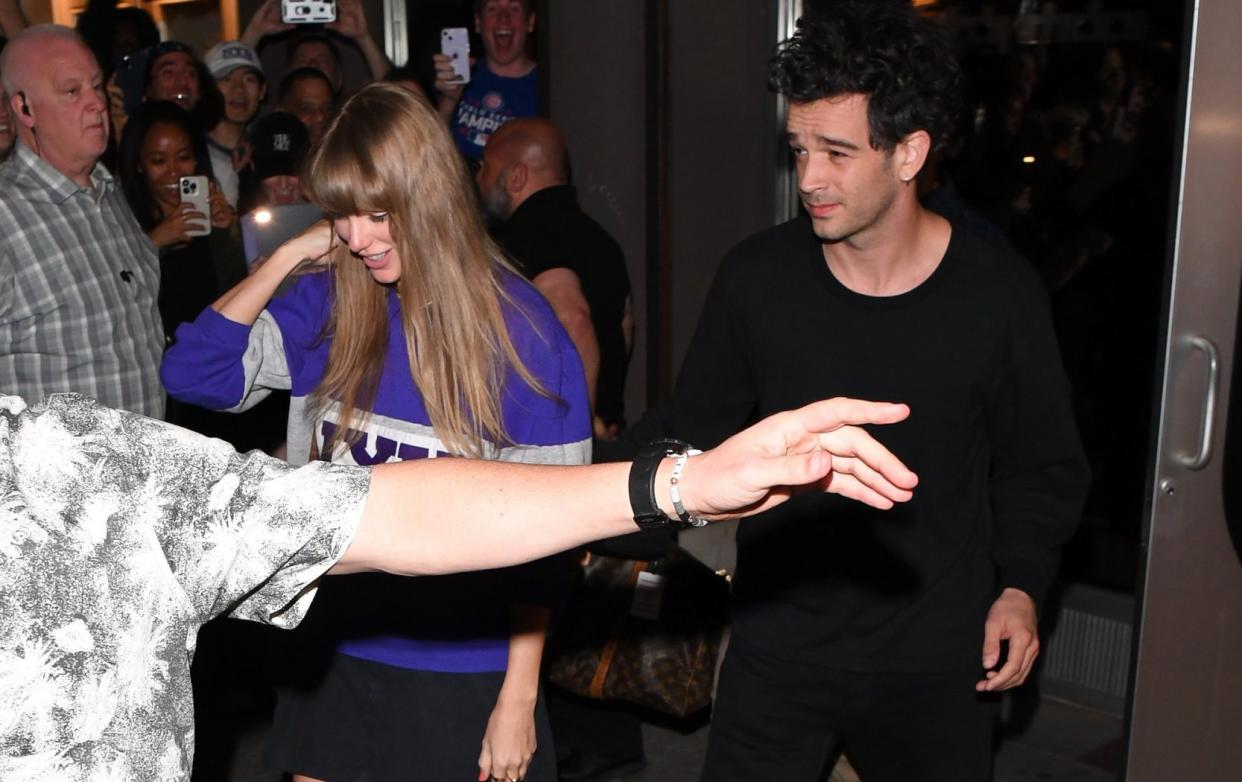Taylor Swift, The Tortured Poets Department: a sharp, savage attack on her British exes

Taylor Swift is the great influencer, the reigning pop superstar of our social media fixated times. The wittily titled Tortured Poets Department may be the apogee of her self-branded gossipy songcraft, a musical roman à clef so densely packed with references to her own torturous love affairs with other beautiful actors, pop stars and sportsmen that it is hard to decide whether you are listening to a song cycle or a catching up with a soap opera. (The album was released in two parts, and the the “surprise” Anthology album is reviewed here.)
On the simplest of terms, what we have here is a very smart, seductive, lyrically sharp set of smooth synth-pop songs about affairs of the heart, crafted with love, intelligence and passion – another hugely appealing addition to Swift’s expanding canon. But it can be hard to disentangle the hook lines from the headlines on an album that is not so much a blockbuster entertainment release as a global news event, to be endlessly deciphered, decoded and deconstructed from gossip forums to business pages.
So here’s my hot take on the over-arching narrative of the 34-year-old’s 11th original album, one she has described as a “lifeline” album she “really needed” to make. Although it features one sumptuously sad and gorgeous, lyrically forensic dissection of a fading romance with a depressed Brit on So Long, London (that would be actor Joe Alwyn, who she dated for six years, but sounds like she got over in about six minutes), the arc of this album is about a torrid and obsessive affair with a bad boy poet.
That would presumably be Matty Healy, the frontman for the 1975, who is likely to wince when he hears what she has to sing about how he ghosted her, let her down, broke her heart and otherwise failed to live up to basic standards of romantic decency.
The album’s stand out track is the icily vengeful The Smallest Man Who Ever Lived, on which she rails against the duplicity of her ex, questions whether he was ever sincere, and evens burns him with a sexual double entendre: “Once your queen had come / You treat her like an also-ran / You didn’t measure up / In any measure of a man.” Impressively, the backing amps up with the tone of Swift’s vengeful rage, rising like a percussive tsunami to wash away her feelings.

But the same fickle lover is disposed of with more gentle sorrow on brooding piano ballad LOML, an acronym for both Love of My Life and Loss of My Life. Some real heartbreak has gone into these songs, and Swift’s fantastic singing makes sure you can feel every emotion.
The album’s title alerts us to the artist’s poetic license, and it is surely absurd to read songs too literally – even though that is inevitably what will happen. Indeed, Swift can’t really complain about the prurient obsessiveness of the coverage she attracts (though she does on the barnstorming Who’s Afraid of Little Ol’ Me), since she herself declares she is the only one who can “decode” her troublesome amour on a witty title track that references Healy’s tattoos, cigarettes and typewriter (he is known to write songs on an Olivetti) whilst mocking both of their poetic pretensions: “You’re not Dylan Thomas / And I’m not Patti Smith / This ain’t the Chelsea Hotel / We’re modern idiots.”
And it doesn’t take too much decoding of cheesy sports puns to work out that the album’s penultimate song, The Alchemy, is directed towards her latest paramour, American footballer Travis Kelce. “This happens once every few lifetimes” she gushes, albeit preceding songs imply that Swift’s commitment can be rather more fickle than that.
The Tortured Poets Department is effectively Swift’s breakup album. In terms of emotional insight and sheer singer-songwriter genius, it is not in the league of such heartbreak classics as Bob Dylan’s Blood on the Tracks and Joni Mitchell’s Blue, but at least it reaches for such heights. Swift knows her way around metaphors and similes and delights in conjuring delicately cascading tranches of clever puns and dazzling word play rooted in real feelings.
Yet she chooses to deploy that wordy singer-songwriter style in a modern pop setting determined to lay radio hooks on thick. There’s an unarguable charm to the romcom country pop of But Daddy I Love Him and I Can Fix Him (No, really, I Can), the sci-fi synth-pop of My Boy Only Breaks His Favourite Toys and Down Bad, and crowd pleasing electro banger I Can Do It With A Broken Heart. But it is only when Swift stops trying to please everyone all the time and bares her soul and her teeth that she really draws blood.
On the thoughtful album closer, Clara Bow, she takes a stab at the entertainment industry’s obsession with youth and beauty, the lies and smoke it wafts over starry eyed wannabes and its tendency to compare everyone to someone else. “You look like Taylor Swift in this light, we’re loving it,” she archly notes. “You’ve got edge, she never did.” There are some welcome edges here, but I venture that when she is ready to stop feeding the American dream machine, that is when she will be ready to make her masterpiece.
Tortured Poets Department: The Anthology, review: Swift’s surprise album is less high powered – but still packs a punch ★★★★☆
Just when you think it’s safe to go back in the water… The great influencer Taylor Swift confounded critics, bamboozled fans, gamed the music industry and unravelled the best laid plans of global news media by releasing not one but two albums’ worth of new songs in one fell swoop.
The Tortured Poets Department is her official new album, a 16 song roman à clef about her torturous love life. But it was dropped on streaming platforms simultaneously with the previously unannounced and even unsuspected The Tortured Poets Department: The Anthology, another 15 songs worth of musical ruminations on love, betrayal, broken hearts and vengeance. So what exactly is this? Taylor unredacted? Swift unexpurgated? Or just the endless spewing of a logorrheic diarist who doesn’t know how to listen to an editor?
In purely business terms in the age of streaming, the more songs an artist releases the merrier, the idea being to lock listeners into the longest streaming session possible, with each song listened to adding to the record company revenue (and lessening the possibility they will wander off and listen to someone else). On artistic terms, it seems a more dubious strategy, blurring the purity of expression offered by a focused piece of work by packing it out with discards, second thoughts and also-rans. Never mind the quality, just marvel at the quantity.
But, let’s face it, Swift is nobody’s fool. She is the biggest star in the world who has deftly strategized her own career, an almost absurdly prolific singer-songwriter with a reputation for impossibly high standards. I suspect the real reason for the sheer scale of this release is that she has got a lot on her mind and wants people hear it all. The official Tortured Poets collection is a carefully tailored work offering a strong narrative delivered with enough musical variety to appeal to mainstream listeners of all levels of fandom and commitment.
But while it is less commercially focused, there is no discernible drop of quality on the expanded Anthology, crammed to bursting with beautifully worked songs that add different shades and angles to her essential premise of a woman working out why her love life has left her in such emotional tatters.
This second batch of songs starts very strong with Black Dog, which seems to contribute to the main album’s narrative of her betrayal by a fickle lover most fans have identified as Matty Healy of the British rock group the 1975. It’s vengeful, angry with a big sound that could have found a place in the official album and a punchy hook: “Old habits die screaming.”

As a collection, though, it offers a less high-powered, more subtle and less forensically direct series of thoughts and feelings about failed romance, set in large part to the moody acoustic guitar picking, delicate piano and amorphous synth soundtracks favoured by Aaron Dessner of alt rock group the National, who has co-written 10 of the songs here.
Her more hooky pop cohort, Jack Antonoff, held chief cowriter role on the main collection with eight songs but only contributes to two songs. The result is a tonal difference, more Folklore than Midnights, a sense of thoughtful marginalia rather than straight to the jugular pop.
There is less here to worry Matty Healy, as Swift offers a series of moodily understated but elaborately phrased and philosophically considered character studies (Cassandra, Peter, Robin) with more focus on her own flaws (The Albatross, The Bolter, I Look in People’s Windows, I Hate It Here), rather than vengeful takes on her ex-lover’s flaws. Nevertheless, it is still peppered with memorable lines that could make an ex wince, such as imgonnagetyouback’s pithy putdown “I’m an Aston Martin that you steered straight into the ditch / Then ran and hid.”
Or how about “You said you loved me but you loved drugs more” from Chloe or Sam or Sophia or Marcus? It only really picks up tempo on the new wave pop rock chunk of So High School, but even here there is a sense of musical restraint on a song that strains to go the full Olivia Rodrigo. Fans will be intrigued by thanK you aIMee, a sarcastically vicious broadside at a high school bully in which Swift blatantly admits she has changed names so that her former tormenter cannot bask in reflected glory. What do those capital letters in the title represent, I wonder? KIM? Somebody’s life is going to be made hell by internet sleuths.
The Collection ends very strongly with ruminative piano ballad The Manuscript, a clever piece of lyrical work in the form of a script examining a May / December relationship from the distant past with an older perspective, which adds a writerly grace note to the whole “tortured poet” conceit. “Now and then I read the manuscript / But the story isn’t mine anymore.”
This story, indeed, is about to be pored over, dissected and examined from every possible angle by an obsessive fan base who hang on Swift’s every word. But honestly, after 31 songs and 122 minutes listening to Swift’s ruminations on her tortured love life, it would be a stony-hearted listener who wouldn’t feel real sympathy for the biggest star in the world, or find something to touch their own.
The Tortured Poets Department
All the references you may have missed


